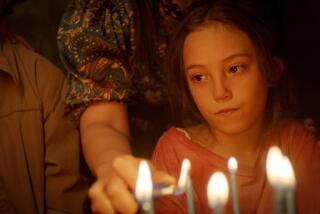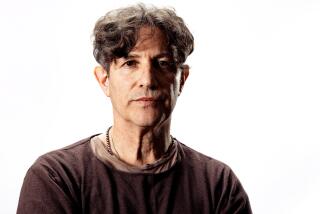Review: François Ozon’s haunting ‘Frantz’ illuminates the mystery of postwar grief

Jusin Chang reviews “Frantz” directed by François Ozon, starring Pierre Niney, Paula Beer and Ernst Stötzner. Video by Jason H. Neubert.
In the opening moments of “Frantz,” the latest intricately layered mystery from the French writer-director François Ozon, a German woman named Anna (Paula Beer) visits the grave of her fiancé, a soldier recently slain in the trenches of World War I. You can sense the war’s immense reach in a few fleeting details — a man who whistles in Anna’s direction is missing an arm — but also in the eerie quiet that has descended on the town’s cobbled streets and in the somber cast of the movie’s black-and-white images.
If you happen to have seen Ernst Lubitsch’s “Broken Lullaby,” the 1932 antiwar drama on which this new film is based, you might also sense something more: a curious and telling shift in perspective. Lubitsch’s film, adapted from a play by Maurice Rostand, was a rare message picture from a director celebrated for his exquisite comic touch, unfolded through the eyes of a French veteran making an unexpected visit to the grieving loved ones of a dead German soldier.
“Frantz” retains the earlier film’s central premise and pacifist themes. A Parisian musician named Adrien Rivoire (Pierre Niney) has come to pay his respects to Dr. Hoffmeister (Ernst Stötzner) and his wife, Magda (Marie Gruber), and to share his memories of their fallen son, Frantz (played by Anton von Lucke in flashbacks). But this time, the story’s moral and dramatic fulcrum is Anna, whose loving, protective attitude toward the Hoffmeisters, whom she regards as her own parents, is matched by her intense curiosity about this stranger in their midst.
The presence of a Frenchman in Germany so soon after the Great War does not go unremarked upon by Dr. Hoffmeister, who receives Adrien coldly at first, or by the glowering locals — one of whom, Kreutz (Johann von Bülow), wants to marry Anna himself. Adrien, for his part, is sympathetic but not entirely above suspicion. His recollections of many happy hours spent with Frantz in Paris before the war, visiting museums and playing the violin together, bring the Hoffmeisters no small measure of solace. But his sad eyes and halting, fearful demeanor seem to tell a darker, more unsettling story.
That story will not be revealed here, though Ozon, a master of misdirection and one of French cinema’s most prolific chroniclers of gay desire, delights in raising the sort of romantic possibilities that are easier for an audience to countenance now than they were in 1919. More than once, “Frantz” hints that it will reveal itself as a homoerotic reworking of “Broken Lullaby.” But Ozon has something simpler and no less intriguing up his sleeve.
One of the director’s chief aims here — articulated with rueful clarity by Stötzner’s sober-minded doctor — is to eliminate the distractions of nationalism and politics, and to remind his characters and his audience of the unimaginable suffering endured on both sides of the conflict. Not for nothing has Ozon rechristened the dead German soldier “Frantz,” playfully evoking both his own name, François, and the nation of France itself: It’s as if he were suggesting that the responsibility for a man’s death does not always belong to his killer alone.
At one point, Ozon goes so far as to deconstruct a famous scene from “Casablanca,” investing a moment of unambiguous moral triumph with undercurrents of menace and dread. By this point, “Frantz” has shaken off the last vestiges of “Broken Lullaby” and plunged forward in an entirely new narrative direction, one that begins when Anna boards a train for France and sets out to find answers of her own.
In doing so, she becomes the latest in a line of richly conflicted Ozon heroines — the women played by Charlotte Rampling in “Under the Sand” and Catherine Deneuve in “Potiche” come especially to mind — forced to confront impossible situations, usually set in motion by the men in their lives. Anna, reeling from devastation and disbelief to a startling rush of desire, doesn’t know what either the past or the future holds, but she rises to the occasion with a bracing mix of clever calculation and pure instinct.
Something similar might be said of Ozon, whose work often attempts — not always successfully, but always impressively — to bridge the gap between style and feeling, between his flair for formal trickery and his desire to usher the viewer into a realm of unbridled emotion. In perhaps his most Ozonian gesture, he occasionally floods cinematographer Pascal Marti’s monochrome palette with a sudden infusion of warm color, usually to signal a flashback to happier times. These moments are sometimes dreams, sometimes memories and sometimes beautiful lies, which is very much to the director’s point.
One of the key questions he’s asking here is about the moral necessity of telling a falsehood, particularly when the need to shield those already in mourning from further pain becomes its own moral imperative. “Frantz” achieves its own version of this paradox. It is a cunningly crafted fiction, full of visual artifice and narrative sleight-of-hand, that by the end could hardly feel more sincere.
------------
‘Frantz’
In German and French with English subtitles
MPAA rating: PG-13, for thematic elements including brief war violence
Running time: 1 hour, 53 minutes
Playing: Nuart Theatre, West Los Angeles
See the most-read stories in Entertainment this hour »
Movie Trailers
More to Read
Only good movies
Get the Indie Focus newsletter, Mark Olsen's weekly guide to the world of cinema.
You may occasionally receive promotional content from the Los Angeles Times.











